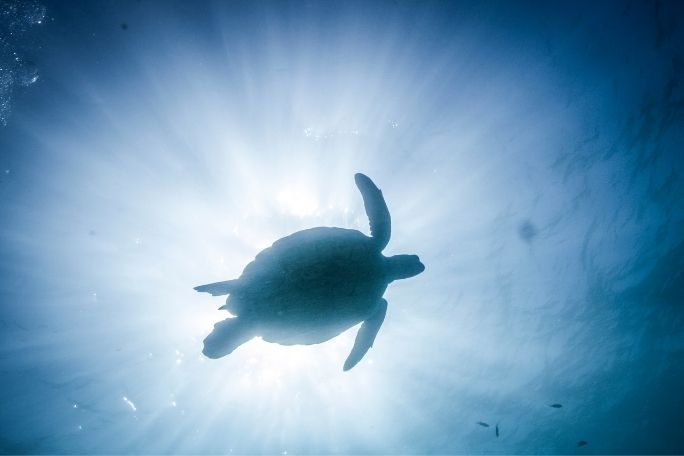Lesson summary
This lesson incorporates clips from Blue The Film as learning inspiration. Students are introduced to the topics of the unit by exploring how they feel about the ocean and some of the animals that live there. Students are then asked to consider what life in the ocean is like, and investigate the concept that without BLUE (the ocean) there is no GREEN (the land). Students respond to this concept by developing their own creative piece to inspire others to connect to the ocean.
Learning intentions:
Students will...
- Students understand that the health of life on land is dependent upon healthy oceans.
Success criteria:
Students can...
- critically examine the meaning and purpose of a clip
- share personal thoughts with others
- Identify some ways we can all help marine species.
Lesson guides and printables
Lesson details
Curriculum mapping
Australian Curriculum content descriptions:
Year 5 English:
- Plan, draft and publish imaginative, informative and persuasive print and multimodal texts, choosing text structures, language features, images and sound appropriate to purpose and audience (ACELY1704)
Year 6 English:
- Plan, draft and publish imaginative, informative and persuasive texts, choosing and experimenting with text structures, language features, images and digital resources appropriate to purpose and audience (ACELY1714)
Year 5 Science:
- Scientific knowledge is used to solve problems and inform personal and community decisions (ACSHE083)
Year 6 Science:
- Scientific knowledge is used to solve problems and inform personal and community decisions (ACSHE100)
Syllabus outcomes: EN3-2A, ST3-7PW.
General capabilities: Critical and creative Thinking, Literacy.
Cross-curriculum priority: Sustainability OI.1.
Relevant parts of Year 5 English achievement standards: Students create imaginative, informative and persuasive texts for different purposes and audiences.
Relevant parts of Year 6 English achievement standards: Students create detailed texts elaborating on key ideas for a range of purposes and audiences.
Relevant parts of Year 5 Science achievement standards: Students discuss how scientific developments help us solve problems.
Relevant parts of Year 6 Science achievement standards: Students explain how scientific knowledge helps us to solve problems.
Unit of work: Blue The Film: Inquiry – Years 5 & 6.
Time required: 60 mins.
Level of teacher scaffolding: Medium – lead activities and guide discussion.
Resources required
- Student Worksheet – one copy per student
- Device capable of presenting a website to the class
- Small piece of recycled paper (half A4 size)
- Pencils
Skills
This lesson is designed to build students’ competencies in the following skills:
- Communication
- Creativity
- Global Citizenship
Additional info
Blue is a feature documentary film charting the drastic decline in the health of our oceans. With more than half of all marine life lost and the expansion of the industrialization of the seas, the film sets out the challenges we are facing and the opportunities for positive change. Blue changes the way we think about our liquid world and inspires the audience to action. Find out how to screen or download the film here. Along with the film is an ambitious global campaign to create advocacy and behaviour change through the #oceanguardian movement. To become an ocean guardian, see the website.


Welcome back!
Don't have an account yet?
Log in with:
By signing up to Cool.org you consent and agree to Cool's privacy policy to
store, manage and process your personal information. To read more, please see
our privacy policy here(Opens in new tab).
Create your free Cool.org account.
Many of our resources are free, with an option to upgrade to Cool+ for premium content.
Already have an account?
Sign up with:
By signing up to Cool.org you consent and agree to Cool's privacy policy to
store, manage and process your personal information. To read more, please see
our privacy policy here(Opens in new tab).